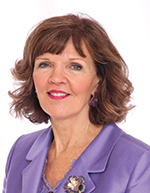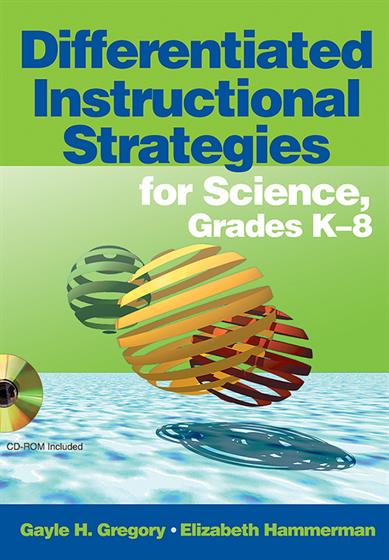
Hands-on, Practical Guidance for Educators
From math,
literacy, equity, multilingual learners, and SEL, to assessment, school counseling,
and education leadership, our books are research-based and authored by experts
on topics most relevant to what educators are facing today.
Differentiated Instructional Strategies for Science, Grades K-8
The authors outline an approach for creating differentiated K–8 classrooms where all learners can thrive and succeed in science. Aligned with national science curriculum standards, this resource provides tools for accommodating individual learning styles and strengthening science instruction, including:
- Grade-appropriate sample lessons and strategies for inquiry-based, problem-based, and cooperative learning
- Guidelines for creating performance tasks that have real-world applications
- Methods for using data-based assessment before, during, and after learning
- A collection of templates, planners, checklists, and graphic organizers
- A CD-ROM with reproducibles for classroom instruction
- Grade Level: PreK-12
- ISBN: 9781412916516
- Published By: Corwin
- Year: 2008
- Page Count: 200
- Publication date: February 19, 2008
Price: $42.95
For Instructors
When you select 'request review copy', you will be redirected to Sage Publishing (our parent site) to process your request.
Description
"This book addresses a real area of need and contains an abundant set of strategies."
—Susan Koba, Educational Consultant
"This is an excellent sourcebook for science teachers who are looking for strategies to engage diverse learners."
—Phyllis Milne, Associate Director of School Administration
York County School Division, Yorktown, VA
Help all your students "do" science confidently and successfully!
Preparing students to understand and adapt to the rapid pace of scientific and technological changes is an important educational priority. Using proven strategies for differentiating instruction, authors Gayle H. Gregory and Elizabeth Hammerman provide a blueprint for strengthening science instruction and accommodating students' individual learning styles.
This educator-friendly resource is aligned with national science curriculum standards and includes:
- Grade-appropriate sample lessons and strategies for inquiry-based, problem-based, and cooperative learning
- Guidelines for creating performance tasks that have real-world applications
- Methods for using data-based assessment before, during, and after learning
- A collection of templates, planners, checklists, and graphic organizers
- A CD-ROM with reproducibles for classroom instruction
Rich in content and tools, Differential Instructional Strategies for Science, Grades K–8 is the perfect resource to help elementary and middle school students become more creative and engaged thinkers and inquirers.
Key features
- Prepares learners to adapt and adjust to the accelerating pace of change in science and technology
- Aligned with national curriculum standards for science knowledge and skills
- Includes a generous collection of templates, planners, checklists, rubrics, and graphic organizers
- Features sample lessons for grades K–8
- Provides instructional and assessment strategies for emerging learners, developing learners, and fluent learners at all stages of development
- By the author of Corwin's best-selling Differentiated Instructional Strategies: One Size Doesn't Fit All
- Includes a CD-ROM with reproducibles for classroom instruction
Author(s)

Gayle H. Gregory
Gayle H. Gregory is first and foremost a teacher, having experienced teaching and learning in elementary, middle, and secondary schools, community colleges, and universities. She has had extensive district-wide experience as a curriculum consultant and staff development coordinator. Gayle was principal/course director at York University for the Faculty of Education, teaching in the teacher education program.
Her areas of expertise include brain-compatible learning, differentiated instructional and assessment strategies, block scheduling, emotional intelligence, student motivation, RTI Tier One, collaborative learning, common core, renewal of secondary schools, enhancing teacher quality, coaching and mentoring, managing change, and building professional learning communities. She also a trainer for Visible Learning Plus with Corwin.
She is an author of numerous books related to educational neuroscience and differentiated instruction, assessment, and curriculum, including the following titles:
• Data Driven Differentiation in the Standards-Based Classroom, Second Edition (2014, with Lin Kuzmich)
• Differentiated Instructional Strategies: One Size Doesn’t Fit All, Third Edition (2013, with Carolyn Chapman)
• Differentiated Instructional Strategies Professional Learning Guide: One Size Doesn’t Fit All, Third Edition (2013)
• Differentiated Literacy Strategies for English Language Learners, Grades K–6 and Differentiated Literacy Strategies for English Language Learners, Grades 7–12 (2011, with Amy Burkman)
• Differentiated Instructional Strategies for the Block Schedule (2010, with Lynne E. Herndon)
• Student Teams That Get Results: Teaching Tools for the Differentiated Classroom (2009, with Lin Kuzmich)
• Teacher Teams That Get Results: 61 Strategies for Sustaining and Renewing Professional Learning Communities (2009, with Lin Kuzmich)
• Differentiated Instructional Strategies for Science, Grades K–8 (2009, with Elizabeth Hammerman)
• Differentiating Instruction With Style: Aligning Teacher and Learner Intelligences for Maximum Achievement (2005)
• The Activities for Differentiated Classroom series (2007, with Carolyn Chapman)
She is affiliated with organizations such as ASCD and Learning Forward. Her ASCD publication is The Motivated Brain: Improving Student Attention engagement and Perseverance (2015, with Martha Kaufeldt).
Gayle consults internationally with teachers, administrators, and staff developers.
She and her family of two daughters and two granddaughters all reside in Burlington, Ontario.
Gayle is committed to lifelong learning and professional growth for herself and others. She may be contacted at gregorygayle@netscape.net, www.gaylehgregory.com, and @gaylegregory6.

Elizabeth Hammerman
Elizabeth Hammerman is a dedicated science educator and consultant. Her professional background includes teaching science at the middle school and high school levels and over 20 years of experience teaching university science education courses and co-directing funded grant projects. She has done extensive professional development with teachers in the field, specializing in curriculum development and implementation, performance assessment, and effective teaching and learning. The need for high-quality professional development programs and materials in science education became apparent throughout the many projects and professional relationships with teachers who were eager to increase their knowledge base, skills, and confidence for teaching science more effectively.
Hammerman has co-authored a book on performance assessment in science and authored a database of science assessment tasks. She has published articles, presented programs at national conferences, consulted nationally, and developed curriculum and assessments for cutting-edge school districts and commercial products.
Since relocating to North Carolina in 1999, Hammerman has been a math/science consultant for a consortium of seven county school systems, has taught undergraduate and graduate courses in teacher education and science education, served as director of education and professional development for Virtual Learning Systems, and worked as a consultant for the North Carolina Department of Public Instruction. She is actively involved in professional development and continues to work on a series of professional development books for science education for Corwin Press.
Table of Contents
Acknowledgments
About the Authors
Introduction
Differentiated Instruction
Teaching Matters
Clarifying Instructional Goals
Differentiated Instruction in Action
Part I. Effective Science Education
1. Creating a Climate for Differentiated Instruction
A Climate for Learning
A Safe and Enriched Environment
Internet Resources Related to Health and Safety
Natural Learning Systems
Emotional Learning System
Social Learning System
Physical Learning System
Cognitive Learning System
Reflective Learning System
Learning Systems With Links to National Standards
A Planning Guide for Differentiated Instruction
Phases of the Planning Guide
2. Scientific and Technological Literacy for the Twenty-First Century
Scientific Literacy
Science Education Standards
Unifying Concepts and Processes
Process and Thinking Skills in K-8 Science
Dispositions That Underlie Science
Dimensions of Learning
Technological Literacy
Views of Technology
Integration of Information and Communication Technology (ICT)
3. Knowing the Learner
Multicultural Education
Multicultural Education in Science
Gender Equity
Gender Equity in Science
Learning Modalities
Learning and Thinking Styles
Kolb's Learning Styles
McCarthy's 4MAT System
Gregorc's Thinking Styles
Gardner's Theory of Multiple Intelligences
Eight Intelligences Linked to Science
Sternberg's View of Intelligence
Learning Activities Linked to Intelligences
Strategies for PreAssessment
Assessing Prior Knowledge
Addressing Misconceptions
Pretest of Concepts
Pretest of Skills
Part II. Designing Differentiated Instruction
4. Methods and Effective Practices for Increasing Student Achievement
Methods for Teaching and Learning Science
The Roles of Teachers and Student in Methods
Research-Based Effective Practices
Strategies Linked to Brain Research and Classroom Practices
Science Notebooks as Tools for Learning
Lab Reports
Grouping
Cooperative Learning
Adjustable Assignments
Curriculum Compacting
5. Strategies for Activating and Engaging
Strategies for Engagement
K-W-L Charts
Discrepant Events
School Site Investigations
Informal Learning Environments
Video Clips
Guest Speakers
Displays
Literature in Science
Case Studies
6. Strategies for Acquiring and Exploring
Inquiry Defined
Traditional Versus Inquiry-Based Classrooms
Factors That Support Inquiry and Differentiated Instruction in Science
Environments That Support Inquiry-Based Teaching and Learning
Classroom Features
Equipment and Supplies
Management Strategies
Problem-Based Learning
Examples of PBL Topics
Projects
Models
Booklets, Posters, and Brochures
Projects at the Primary, Intermediate, and Middle Grade Levels
Science Fair Projects
Product Testing and Survey Research
Science and Technological Design
Presentations
Stations
Examples of Stations at the Primary Grade Level
Example of Stations at the Intermediate Grade Level
Example of Stations at the Middle Grade Level
Centers
Structured Centers
Exploratory Centers
Relearning Centers
Assessment for Stations and Centers
Choice Boards
Choice Boards for a Primary Level Study of Animals
Contracts
Contract for Rocks and Minerals
Choice Board for Activities
Computer-Based Technologies as Tools for Learning
7. Strategies for Explaining, Applying, and Creating Meaning
Group Discussion
Questions for Thinking and Problem Solving
Discussion Starters
Nonlinguistic Representations for K-8 Science
Charts
Data Tables and Graphs
Creating Graphs
Bar Graphs
Line Graphs
Circle Graphs
Six Types of Graphic Organizers
Four-Corner Organizer
8. Strategies for Elaborating and Extending Learning
Beyond the Basics
Games That Enhance Learning
Cubing
Cubing With Questions About the Moon
Jigsaw
Analogies and Similes
Analogies
Similes
Similes for a Middle Grade Unit on Cells
9. Strategies for Assessing and Evaluating Learning
Assessment and Evaluation
Assessment Strategies in the Science Classroom
Performance Tasks for Learning and Assessment
Creating Rubrics for Teacher Assessment and Self-Assessment
Holistic Rubrics
Generalized Rubrics
Analytic Rubrics
Planning Differentiated Instruction: The Key to Success
Considerations, Resources, and Strategies for Differentiating Instruction in Science
References
Index
Reviews
"Teachers will find techniques to apply in the classroom immediately. The examples are user friendly and easy to understand. There is little doubt that using these strategies will enhance any science classroom."Jennifer Linrud Sinsel, Fifth-Grade Science Teacher
Wichita Collegiate School, KS
"This book addresses a real area of need and contains an abundant set of strategies."Susan Koba, Educational Consultant
"This is an excellent sourcebook for science teachers who are looking for strategies to engage diverse learners. The reader can look for a specific topic and find not only support for the strategies but also specific examples of the teaching tools. The charts, strategies, graphics, and rubrics are reader-friendly!"Phyllis Milne, Associate Director of School Administration
York County School Division, Yorktown, VA
"The book contains a lot of information about national science standards and multiple learning styles, plus good sample units in science and good suggestions for Web sites. The authors are great science teachers who believe wholly in engaging students in the wonder of the natural world."Marcia LeCompte, Intermediate/MultiageTeacher
Klondike Elementary School, West Lafayette, IN
"The book provides very useful information for implementing differentiated instruction. Its research base plus concrete and useable examples mixes the theory with the practical. Teachers will find this book valuable."Mandy Frantti, Science Teacher
Munising High School, MI
“An impressively comprehensive collection of student-centered, research-based classroom practices in one slim, well-organized volume. This book would be a valuable resource to teachers in any setting. Preservice teachers are likely to keep it long after the class has ended to revisit management topics such as organizing a science notebook and creating cooperative groups, as well as to use or adapt the science-interest inventory and organizers for explaining and creating meaning. Districts will benefit from the book’s focus on process skills and pedagogy as well as the integration of 21st-century literacy standards with the science content standards. Science specialists, gifted and talented resource teachers, and special educators will all appreciate the book’s approach to high expectations for students, thinking and problem solving, and authentic assessment. The book would also be an excellent book study as part of the development of professional learning communities.”Teacher Education Materials (TE-MAT) Project
For Instructors
When you select 'request review copy', you will be redirected to Sage Publishing (our parent site) to process your request.

